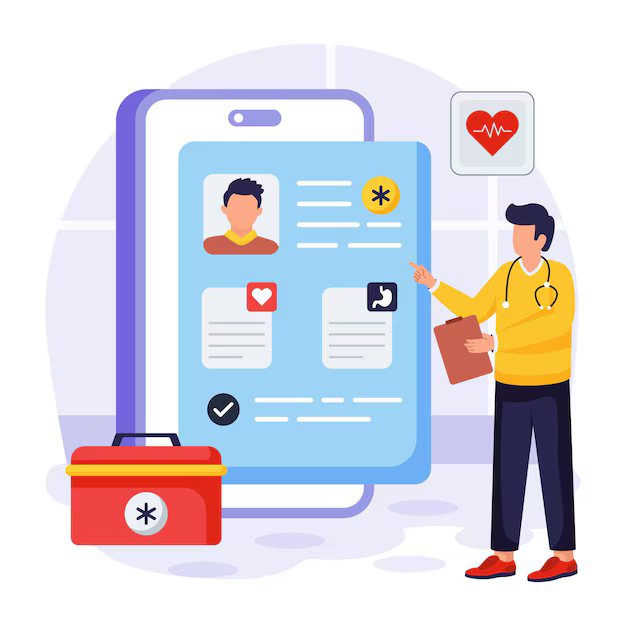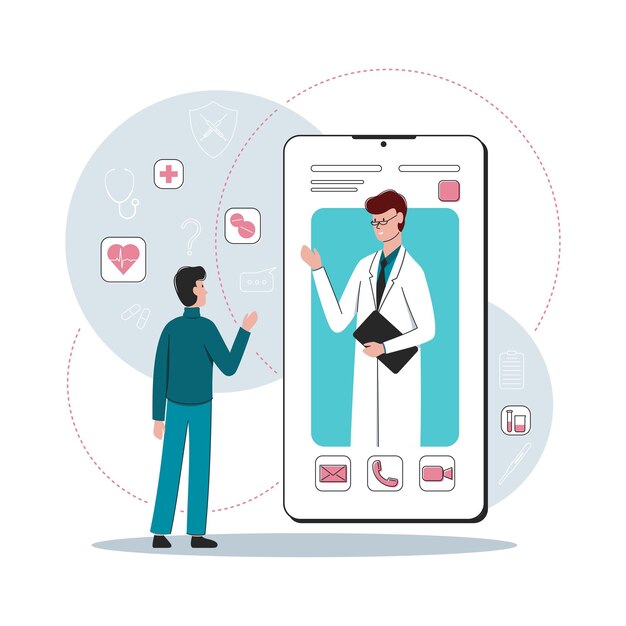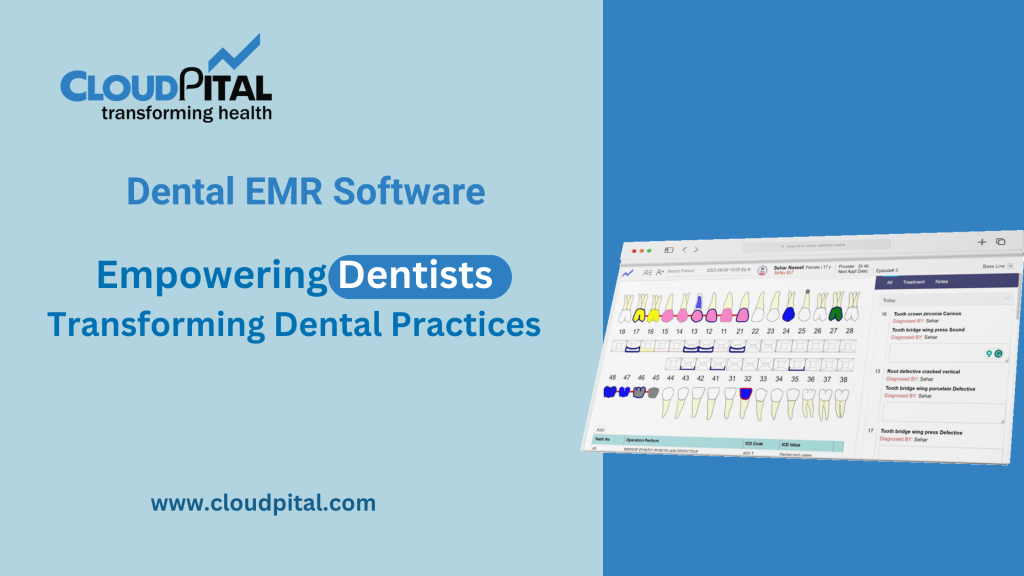Cloudpital # 1 is one of the top Mobile EHR with the introduction of Mobile Electronic Health Records (Mobile EHR), which have transformed the way medical practitioners access and manage patient information. The incorporation of Artificial Intelligence (AI) into Mobile EHR systems elevates this change to a new dimension, bringing forth robust capabilities that improve decision-making, patient care, and administrative effectiveness. Mobile EHR AI is becoming a necessity in today’s healthcare, enabling healthcare professionals to deliver improved, individualized care while streamlining workflows.
Click to Start Whatsapp Chatbot with Sales
Mobile: +966547315697
Email: sales@bilytica.com
Cloudpital # 1 Mobile EHR

AI Enhances Decision Support
One of the main roles of any Electronic Health Record (EHR) system is to enable healthcare professionals to have access to accurate and timely patient information so that they can make well-informed clinical decisions. With the integration of AI into Mobile EHRs, decision support is taken to the next level.
Machine-learning algorithms in Mobile EHR solutions scan a patient’s health information, searching for patterns and deviations that may not be readily apparent to human providers. Such Clinical Decision Support Systems (CDSS) can provide actionable recommendations, such as predictions of risk, suggestions for therapy changes, or warnings regarding potential adverse drug events.
For instance, if a physician is reading the medical history of a patient on a Mobile EHR and the system identifies a potential allergic reaction between two drugs prescribed, the AI system will automatically create an alert, avoiding dangerous errors. This improved decision support reduces errors in medicine, facilitates evidence-based practice, and ultimately enhances patient outcomes.
Predictive Analytics for Enhanced Patient Outcomes
AI-based predictive analytics is perhaps the most influential feature that Mobile EHRs provide. Through data analysis, AI predicts patients’ health patterns, and clinicians can determine risks at an early stage and adopt preventive strategies.
For instance, AI is able to evaluate a diabetic patient’s past history in order to forecast blood glucose changes and send advance warnings on the risk of complications such as hypoglycemia or hyperglycemia. Analogously, AI is able to forecast the readmission risk for chronic disease patients and allow caregivers to intervene pre-emptively to prevent the associated expensive or life-threatening occurrences.
By anticipating upcoming health occurrences, AI-enabled Mobile EHRs are able to assist providers in the delivery of patient-specific care plans that meet the individualized needs of a patient, enhancing long-term health outcomes and decreasing unnecessary hospital admissions.
Natural Language Processing (NLP) for Better Data Entry and Extraction
Natural Language Processing (NLP) is a subfield of AI that allows computers to read, comprehend, and produce human language. In the case of Mobile EHRs, NLP radically improves the capacity to gather meaningful information from unstructured content, including clinical notes, laboratory reports, and discharge summaries.
In conventional Mobile EHR systems, healthcare providers spend considerable time entering and managing patient information. But with NLP and AI, Mobile EHR systems can transcribe voice notes automatically, read handwritten reports, and convert them into structured, searchable data. This saves administrative time and enables clinicians to concentrate on direct patient care.
Secondly, AI can be utilized to identify and pull critical information from clinical documents such as progress notes, hospital records, and radiology reports in a way that simplifies the retrieval of pertinent patient information by healthcare providers quickly. For instance, AI can spot phrases like “diabetes,” “hypertension,” or “history of heart attack” in clinical documents and categorize them in a patient’s file for quick reference, facilitating decision-making speed in the end.

Automating Administrative Processes with AI
Healthcare providers are usually overwhelmed with administrative functions such as coding, billing, and scheduling patients. AI in HIS can automate these functions, freeing up time and minimizing human error.
AI-based systems are capable of automating repetitive administrative tasks like medical coding. AI can recommend proper codes for diagnoses, treatments, and procedures by reviewing patient information and medical notes, making billing both timely and accurate. This not only accelerates the billing process but also minimizes the likelihood of claim rejections based on coding errors.
In addition, AI in Mobile EHR can help with scheduling appointments by forecasting the best time slots for patient visits based on past data, availability, and priority. This minimizes the possibility of scheduling conflicts and maximizes practice efficiency.
AI-Driven Personalized Patient Care
One of the most important roles of Mobile EHRs is to give healthcare providers a complete picture of every patient’s health status. With the integration of AI, Mobile EHR systems can assist in tailoring treatment plans according to the patient’s medical history, lifestyle habits, and current health information.
AI can sort through massive amounts of patient data to identify trends and make personalized suggestions. For instance, if a Mobile EHR system finds that a patient with high blood pressure has not been taking their meds regularly, it can provide automated reminders and suggest lifestyle modifications, such as dietary shifts or stress-reduction methods.
Also, AI can assist in tracking chronic conditions through data from wearable devices like heart rate monitors, blood pressure cuffs, and glucose meters. The system can process this information in real-time and give feedback on whether the existing treatment plan is working or requires a change. AI-based personalized care not only enhances outcomes but also increases patient satisfaction since patients are treated according to their individual needs.
AI Improves Data Privacy and Security
Data privacy and security are critical in healthcare. Mobile EHR systems tend to carry sensitive medical information that, if breached, could lead to serious repercussions for both patients and healthcare professionals.
AI plays a significant role in enhancing data security in Mobile EHR systems. Through AI algorithms, these systems can monitor access patterns, detect unusual behavior, and recognize potential security threats. For example, if an unauthorized user attempts to access sensitive patient information, AI-powered security systems can immediately flag the activity and notify the relevant authorities.
Secondly, AI is able to encrypt and anonymize patient information so that confidential data is kept secure during both storage and transmission. As cybersecurity threats and data breaches grow greater, AI-based data security in Mobile EHR is emerging as a vital tool for keeping patient information private.
AI-Enabled Remote Patient Monitoring
Remote Patient Monitoring (RPM) is one field where AI can really advance Mobile EHR features. With the advent of wearable devices, Mobile EHRs can bring in data from wearable devices so that healthcare professionals can track patients’ well-being in real time.
AI is also important in interpreting the data gathered from remote monitoring devices, including heart rate monitors, glucose monitors, and pulse oximeters. Through continuous monitoring of this incoming data, AI can detect alarming trends—like abnormal heart rhythms or increasing glucose levels—and notify the healthcare provider. This enables clinicians to intervene in a timely manner, even if the patient is not physically in the office.
For instance, a hypertensive patient can use a blood pressure device connected to his or her Mobile EHR. If the AI senses perpetually elevated blood pressure, it will trigger the healthcare provider to adjust the patient’s medication or advise lifestyle adjustments without having to call for office visits.
Enhanced Patient Engagement with AI
AI in EMR systems also promotes increased patient engagement through enabling patients to take charge of their health. AI can drive virtual health assistants that offer personalized health data, appointment reminders, medication regimens, and lifestyle advice to patients.
For instance, an asthma patient can be provided with real-time air quality information and get tips on symptom management during polluted days. AI-driven chatbots in Mobile EHR platforms can also provide patients with common answers to questions, assist with appointment scheduling, and provide medication reminders, enhancing patient experience as a whole.
AI’s ability to engage patients through virtual health assistants leads to improved adherence to treatment plans and empowers patients to stay on top of their health management, which directly contributes to better health outcomes.
Conclusion
AI is no longer a technology of the future—it’s now a core component of healthcare today, particularly when combined with Mobile EHR systems. Through enhancing clinical decision-making, facilitating personalized care, increasing security, and automating administrative work, AI is revolutionizing what can be achieved in healthcare.
As healthcare increasingly welcomes technology, AI-based Mobile EHR solutions will continue to be at the center, optimizing patient care, simplifying workflows, and keeping confidential health information secure. With the increasing capacity of AI, healthcare professionals are now in a position to provide more effective, efficient, and customized care to patients, ultimately changing the whole healthcare system for the better.
Click to Start Whatsapp Chatbot with Sales
Mobile: +966547315697
Email: sales@bilytica.com
What role does AI play in Mobile EHR functionalities? similar software solutions prices were updated on 2026-02-09T03:59:46+00:00 in Saudi Arabia in Mecca, Medina, Riyadh, Khamis Mushait, Yanbu, Jeddah, Dammam, Unaizah, Uqair, Ha’il, Ta if, Al Bahah, Dhahran, King Abdullah Economic City, Najran, Diriyah, Qatif, Khafji, Jubail, Abqaiq, List of Cities and Towns in Saudi Arabia, Ras Tanura, Turubah, Jazan Economic City, Knowledge Economic City, Medina, Khobar, Abha, Tabuk, Saudi Arabia, similar software solutions prices were updated on 2026-02-09T03:59:46+00:00 We also provide in Saudi Arabia services solutions company in Hafar Al-Batin, Udhailiyah, Al-Awamiyah, Hofuf, Hautat Sudair, Buraidah, Tayma, Duba, ‘uyayna, Saihat, Al-Kharj, Al-ula, Jizan, Rumailah, Ar Rass, Arar, Shaybah, Al Majma’ah, Rabigh, Dhurma, Haradh, List of Saudi Cities by Gdp Per Capita, Badr, Sudair Industrial City, Baljurashi, Shaqraa, Al-Khutt, Habala, Ad Dawadimi, Dawadmi, Layla, similar software solutions prices were updated on 2026-02-09T03:59:46+00:00 Price is SAR 100 and this was updated on updated on 2026-02-09T03:59:46+00:00 similar What role does AI play in Mobile EHR functionalities? software solutions prices were updated on 2026-02-09T03:59:46+00:00 in Saudi Arabia in Haql, Afif, Al-Abwa, Farasan, Al-Jaroudiya, Thadig, Al-Thuqbah, Al Wajh, Almardmah, Al-Zilfi, Muzahmiyya, Prince Abdul Aziz Bin Mousaed Economic City, Tharmada’a, Skaka, Um Al-Sahek, Sharurah, Tanomah, Bisha, Dahaban, Al Qunfudhah, Qurayyat, Saudi Arabia, Ha’ir, as Sulayyil, Al Lith, Turaif, Al-Gway’iyyah, Samtah, Wadi Ad-Dawasir, Az Zaimah, Safwa City, Jalajil, Harmah, Mastoorah, Hotat Bani Tamim, Jabal Umm Al Ru’us, Rafha, Qaisumah, Al-Ghat, Hajrah, Al-Hareeq. Excerpt: Jeddah (also spelled Jiddah, Jidda, or Jedda; Arabic: Jidda) is a Saudi Arabian city located on the coast of the Red Sea and is the major urban center of western Saudi Arabia similar software solutions prices were updated on 2026-02-09T03:59:46+00:00 Price is SAR 100 and this was updated on updated on 2026-02-09T03:59:46+00:00



